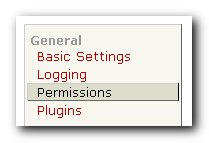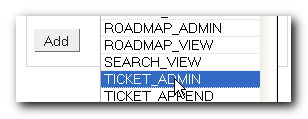Trac Permissions
Table of Contents
Trac uses a simple, case sensitive, permission system to control what users can and can't access.
Permissions are managed using the trac-admin tool or the General / Permissions panel in the Admin tab of the web interface.
In addition to the default permission policy described in this page, it is possible to activate additional permission policies by enabling plugins and listing them in [trac] permission_policies. See TracFineGrainedPermissions for more details.
Non-authenticated users accessing the system are assigned the name anonymous. Assign permissions to the anonymous user to set privileges for anonymous/guest users. The parts of Trac that a user does not have privilege for will not be displayed in the navigation. In addition to these privileges, users can be granted additional individual rights in effect when authenticated and logged into the system. All logged in users belong to the virtual group authenticated, which inherits permissions from anonymous.
Graphical Admin Tab
To access this tab, a user must have one of the following permissions: TRAC_ADMIN, PERMISSION_ADMIN, PERMISSION_GRANT, PERMISSION_REVOKE. The permissions can be granted using the trac-admin command with a more detailed description below:
$ trac-admin /path/to/projenv permission add bob TRAC_ADMIN
Then, the user bob will be able to see the Admin tab, and can access the permissions menu. This menu will allow you to perform all the following actions, but from the browser rather than requiring root access to the server. Use at least one lowercase character in user names, as all-uppercase names are reserved for permissions.
From the graphical admin tab, users with PERMISSION_GRANT will only be allowed to grant permissions that they possess, and users with PERMISSION_REVOKE will only be allowed to revoke permissions that they possess. For example, a user cannot grant MILESTONE_ADMIN unless they have PERMISSION_GRANT and MILESTONE_ADMIN, and they cannot revoke MILESTONE_ADMIN unless they have PERMISSION_REVOKE and MILESTONE_ADMIN. PERMISSION_ADMIN just grants the user both PERMISSION_GRANT and PERMISSION_REVOKE, and users with TRAC_ADMIN can grant or revoke any permission.
Available Privileges
To enable all privileges for a user, use the TRAC_ADMIN permission. This permission is like being root on a *NIX system: it will allow you to perform any operation.
Otherwise, individual privileges can be assigned to users for the different functional areas of Trac and note that the privilege names are uppercase:
Repository Browser
BROWSER_VIEW | View directory listings in the repository browser |
FILE_VIEW | View files in the repository browser |
CHANGESET_VIEW | View repository check-ins |
LOG_VIEW | View revision logs of files and directories in the repository browser |
Ticket System
TICKET_VIEW | View existing tickets and perform ticket queries |
TICKET_CREATE | Create new tickets |
TICKET_APPEND | Add comments and attachments to tickets, and edit description of ticket the user created |
TICKET_CHGPROP | Modify ticket properties (priority, assignment, keywords, etc.) with the following exceptions: edit description of tickets created by others, add/remove other users from cc field when logged in |
TICKET_MODIFY | Includes both TICKET_APPEND and TICKET_CHGPROP, and in addition allows resolving tickets in the default workflow. Tickets can be assigned to users through a drop-down list when the list of possible owners has been restricted.
|
TICKET_EDIT_CC | Full modify cc field |
TICKET_EDIT_DESCRIPTION | Modify description field. User with TICKET_APPEND or TICKET_CHGPROP can modify description of ticket they created.
|
TICKET_EDIT_COMMENT | Modify another user's comments. Any user can modify their own comments by default. |
TICKET_BATCH_MODIFY | Batch modify tickets |
TICKET_ADMIN | All TICKET_* permissions, deletion of ticket attachments and modification of the reporter field, which grants ability to create a ticket on behalf of another user and it will appear that another user created the ticket. It also allows managing ticket properties through the web administration module.
|
Roadmap
MILESTONE_VIEW | View milestones and assign tickets to milestones. |
MILESTONE_CREATE | Create new milestones |
MILESTONE_MODIFY | Modify milestones |
MILESTONE_DELETE | Delete milestones |
MILESTONE_ADMIN | All MILESTONE_* permissions
|
ROADMAP_VIEW | View the roadmap page, which is not yet the same as MILESTONE_VIEW, see #4292 |
ROADMAP_ADMIN | to be removed with #3022, replaced by MILESTONE_ADMIN |
Reports
REPORT_VIEW | View reports, i.e. the View Tickets link. |
REPORT_SQL_VIEW | View the SQL query of a report |
REPORT_CREATE | Create new reports |
REPORT_MODIFY | Modify reports |
REPORT_DELETE | Delete reports |
REPORT_ADMIN | All REPORT_* permissions
|
Wiki System
WIKI_VIEW | View wiki pages |
WIKI_CREATE | Create new wiki pages |
WIKI_MODIFY | Modify wiki pages |
WIKI_RENAME | Rename wiki pages |
WIKI_DELETE | Delete wiki pages and attachments |
WIKI_ADMIN | All WIKI_* permissions, plus the management of readonly pages.
|
Permissions
PERMISSION_GRANT | add/grant a permission |
PERMISSION_REVOKE | remove/revoke a permission |
PERMISSION_ADMIN | All PERMISSION_* permissions
|
Others
TIMELINE_VIEW | View the timeline page |
SEARCH_VIEW | View and execute search queries |
CONFIG_VIEW | Enables additional sections on About Trac that show the current configuration and the list of installed plugins |
EMAIL_VIEW | Shows email addresses even if trac show_email_addresses configuration option is false |
Attachment Permissions
Attachment permissions are handled by LegacyAttachmentPolicy, and unlike the permissions discussed so far, the permissions provided by LegacyAttachmentPolicy are not directly granted. Rather, the ability to create, view and delete attachments is determined by the attachment's parent realm and permissions the user possesses for that realm.
The attachment actions are determined by the following permissions in the ticket, wiki and milestone realms:
| Granted By: | Ticket | Wiki | Milestone |
|---|---|---|---|
ATTACHMENT_CREATE | TICKET_APPEND | WIKI_MODIFY | MILESTONE_MODIFY
|
ATTACHMENT_VIEW | TICKET_VIEW | WIKI_VIEW | MILESTONE_VIEW
|
ATTACHMENT_DELETE | TICKET_ADMIN | WIKI_DELETE | MILESTONE_DELETE
|
An authenticated user can delete an attachment they added without possessing the permission
that grants ATTACHMENT_DELETE.
If explicit attachment permissions are preferred, ATTACHMENT_CREATE, ATTACHMENT_DELETE and ATTACHMENT_VIEW can be created using the ExtraPermissionsProvider. The simplest implementation is to simply define the actions.
[extra-permissions] _perms = ATTACHMENT_CREATE, ATTACHMENT_DELETE, ATTACHMENT_VIEW
An alternative configuration adds an ATTACHMENT_ADMIN meta-permission that grants the other 3 permission.
[extra-permissions] ATTACHMENT_ADMIN = ATTACHMENT_CREATE, ATTACHMENT_DELETE, ATTACHMENT_VIEW
The explicit permissions can be used in concert with LegacyAttachmentPolicy, or LegacyAttachmentPolicy can be removed from permission_policies, in which case only users that have been explicitly granted the corresponding attachment actions will be able to create, delete and view attachments.
Granting Privileges
You grant privileges to users using trac-admin. The current set of privileges can be listed with the following command:
$ trac-admin /path/to/projenv permission list
This command will allow the user bob to delete reports:
$ trac-admin /path/to/projenv permission add bob REPORT_DELETE
The permission add command also accepts multiple privilege names:
$ trac-admin /path/to/projenv permission add bob REPORT_DELETE WIKI_CREATE
Or add all privileges:
$ trac-admin /path/to/projenv permission add bob TRAC_ADMIN
Permission Groups
There are two built-in groups, authenticated and anonymous. Any user who has not logged in is automatically in the anonymous group. Any user who has logged in is also in the authenticated group. The authenticated group inherits permissions from the anonymous group. For example, if the anonymous group has permission WIKI_MODIFY, it is not necessary to add the WIKI_MODIFY permission to the authenticated group as well.
Custom groups may be defined that inherit permissions from the two built-in groups.
Permissions can be grouped together to form roles such as developer, admin, etc.
$ trac-admin /path/to/projenv permission add developer WIKI_ADMIN $ trac-admin /path/to/projenv permission add developer REPORT_ADMIN $ trac-admin /path/to/projenv permission add developer TICKET_MODIFY $ trac-admin /path/to/projenv permission add bob developer $ trac-admin /path/to/projenv permission add john developer
Group membership can be checked by doing a permission list with no further arguments; the resulting output will include group memberships. Use at least one lowercase character in group names, as all-uppercase names are reserved for permissions.
Adding a New Group and Permissions
Permission groups can be created by assigning a user to a group you wish to create, then assign permissions to that group.
The following will add bob to the new group called beta_testers and then will assign WIKI_ADMIN permissions to that group. Thus, bob will inherit the WIKI_ADMIN permission.
$ trac-admin /path/to/projenv permission add bob beta_testers $ trac-admin /path/to/projenv permission add beta_testers WIKI_ADMIN
Removing Permissions
Permissions can be removed using the 'remove' command.
This command will prevent the user bob from deleting reports:
$ trac-admin /path/to/projenv permission remove bob REPORT_DELETE
Just like permission add, this command accepts multiple privilege names.
You can also remove all privileges for a specific user:
$ trac-admin /path/to/projenv permission remove bob '*'
Or one privilege for all users:
$ trac-admin /path/to/projenv permission remove '*' REPORT_ADMIN
Creating New Privileges
To create custom permissions, for example to be used in a custom workflow, enable the optional tracopt.perm.config_perm_provider.ExtraPermissionsProvider component in the "Plugins" admin panel, and add the desired permissions to the [extra-permissions] section in your trac.ini. For more information, please refer to the documentation on the TracIni page after enabling the component.
Default Permissions
By default on a new Trac installation, the anonymous user will have view access to everything in Trac, but will not be able to create or modify anything. On the other hand, the authenticated users will have the permissions to create and modify tickets and wiki pages.
anonymous
BROWSER_VIEW CHANGESET_VIEW FILE_VIEW LOG_VIEW MILESTONE_VIEW REPORT_SQL_VIEW REPORT_VIEW ROADMAP_VIEW SEARCH_VIEW TICKET_VIEW TIMELINE_VIEW WIKI_VIEW
authenticated
TICKET_CREATE TICKET_MODIFY WIKI_CREATE WIKI_MODIFY
See also: TracAdmin, TracFineGrainedPermissions



